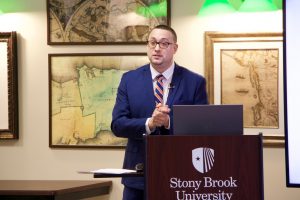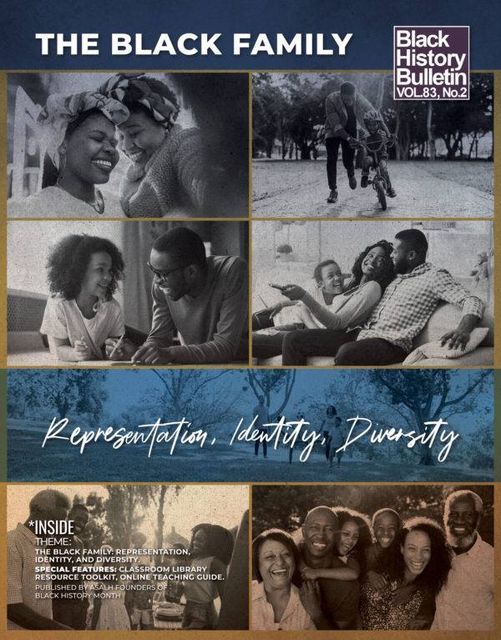Blog
A Critical Conversation of Kinship with the Founders of Black History Month
Established on September 9, 1915, by Dr. Carter G. Woodson, the founders of Black History Month—the Association for the Study of African American Life and History (ASALH)—continue to carry out Dr. Woodson’s transformative work and legacy advocating to teach the historical contributions of people of African descent.

With a mission to “promote, research, preserve, interpret and disseminate information about Black life, history and culture to the global community,” the work of ASALH remains critical in ensuring the contributions of African Americans remain central to educating the public beyond Black History Month in February. One of the primary activities of ASALH is establishing the annual theme for Black History Month. Dr. Woodson established Negro History Week in 1926 and realized the importance of providing a theme to “focus the attention of the public,” as explained on ASALH’s website.
This year’s theme, The Black Family: Representation, Identity and Diversity, seeks to shed light on the historical strengths and diversity of the Black family within its diasporic nature, as well as the historical, stereotypical ways in which it has been both revered and vilified.
As an agency dedicated to maintaining and strengthening Black family bonds through kinship, ASCI spoke with ASALH Executive Council member and Associate Professor of Africana Studies & History at Stony Brook University Dr. Zebulon Miletsky to gain insight into the development and important historical context of this year’s Black History Month theme.
“The Black History Month themes are chosen years in advance at ASALH. So, this was several years ago that we came up with the idea for the Black family,” he begins.

“We coincide all of our themes with a historical connection, and in this case, the connection is not so much an anniversary, but this year, the theme is the Black family because that’s a topic that we—all of us who work in academia, as well as practitioners—were looking to be an all-encompassing theme and connect it with a lot of different approaches.
“Remember, we’re the Association for the Study of African American Life and History. We’re history, but we’re also life. So, this Black family theme is more along the lines of reflecting on our life area, which was just as important to Carter G. Woodson as the historical facts and information.”
The historical, natural practice of kinship care within the Black family has played a critical role in shaping its identity. Yet, the lack of recognition of its importance within American societal standards has led to controversial, stereotypical views of the Black family and the historical implications of family separation.
“As a historian and a scholar of Africana studies, I first came to understand [kinship care] in graduate school while learning about the Moynihan report,” Dr. Miletsky explains. “I think it’s something that eludes a lot of people because it’s not a simple thing to understand how the implications of a government report coming out at the time it did, who it was done by, and the unforgivable ignorance at the time about the family life and how it worked.
“The Moynihan report missed a key factor in African American culture and family bonds. It’s obvious that a lot of this comes out the experience of family separation that is rooted in American Southern—and Northern—slavery. Moynihan having missed that understanding missed such a huge piece. However, in Herbert Gutman’s response—The Black Family in Slavery and Freedom—he was able to connect with the kinship concept very strongly.”
“Kinship is powerful. To me, kinship has stood in the gap.”
—Dr. Zebulon Miletsky
He continues, “Kinship is powerful. To me, kinship has stood in the gap. That’s what Gutman proves. He gave one example where he actually looked at the naming of children all throughout enslavement and noticed they’re named after the days of the week. That’s a west African practice.
This flew in the face of Moynihan because he said there was no family structure coming out of slavery whatsoever, and because of family separation, people were ripped out of each other’s arms and it’s like the Hollywood version. [He claimed] we didn’t get the family love. But, the practice of naming a child after a day of the week showed that cultural connection, it showed there was love there. Moynihan basically said the way you see Black families today—like when you watch ‘Good Times’ or you see households where dad’s not there or you see junkies, etc.—Moynihan said it’s always been that way. And that’s where he violated us as a people. And, to tie this all the way back through slavery was devastating to African American families.”

It is just as important to understand the historical identity of the Black family as it is to celebrate its evolution and diversity. Dr. Miletsky alludes to the various ways in which the Black family continues to exemplify unique diversity.
“There’s regional diversity. There’s diversity in terms of single-headed households. A lot of our families are headed by LGBTQ+ parents,” he explains. “The whole issue of addressing homophobia is something that we’re still working on in the Black community and in the Black family. But, things are starting to change. That in itself speaks to diversity.
“The other ways we’re diverse are in terms of our racial background and makeup. Interracial relationships are not a new phenomenon. In fact, it’s a very old phenomenon. The right to marry the person may be newer, but, for a lot longer in our history, the interracial liaisons were violations. Remember, one thing Black folks could not do was get married on the plantations. It was forbidden. There weren’t any legal ceremonies at all, but it was something the master did at his whim, and preference. If he chose to do so he would do this.”
As a person of mixed race, Dr. Miletsky understands the importance of empowering other African Americans of mixed race to be able to proudly identify with their culture. “Today, Henry Louis Gates estimated that the African American population is almost 85% mixed,” he notes.
“I started an organization called BLAAC (Biracials Learning about African American Culture) using the principles of what I teach in Africana studies to teach all people about Black history. I use a lot of these same principles to teach biracial kids who are Black but just don’t have the connection. And, many of them don’t have the connection because they were adopted.”
We need to stick together as a people. This is not the time to be divided in the Black community. We all are related. We’re all family, still.”
—DR. ZEBULON MILETSKY
The Black family is the foundation of African American life and culture. Even amid enslavement and the historical, intentional attempts to separate them, Black families have used—and continue to use—natural practices like kinship care and education to pass down cultural roots and break down the barriers that have worked against them for centuries.
The work of ASALH continues to aid in this fight to maintain the rich history of Black people in America. To continue to celebrate this year’s theme with ASALH, visit its website to find information about attending the 2021 Virtual Black History Month Festival events throughout the month!